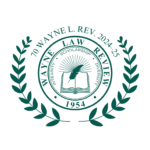Tag: Michigan Law
Revisiting Free Exercise in the Michigan Constitution
Joseph Brennan Read More …
Legalizing Fraud in Michigan Contract Law
Heather Piotrowski Read More …
Understanding the Overrulings: A Response to Robert Sedler
Trent B. Collier & Philip J. DeRosier Read More …
Constitutional Law
Michael David Warren, Jr. Read More …
